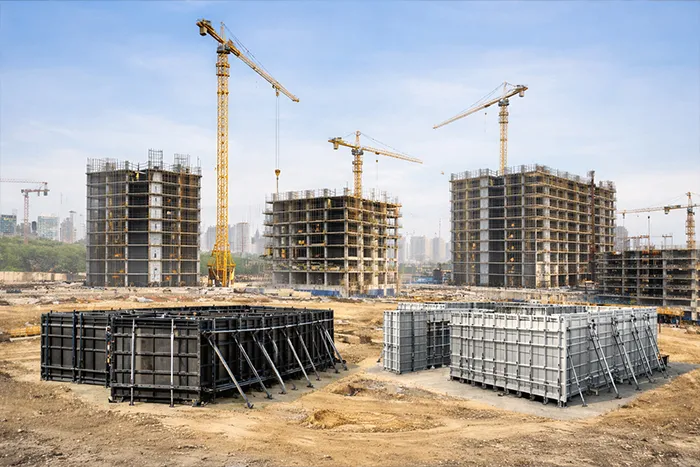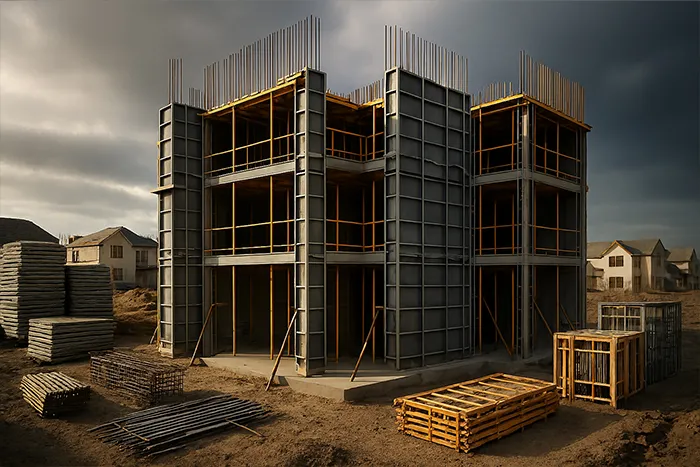
- Published:
- Written by: B.F.S Industries
Best Formwork Systems for Residential Construction
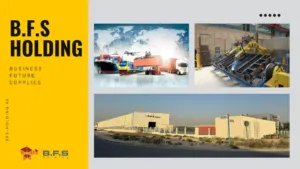
FREE DOWNLOAD – B.F.S. HOLDING
Explore the full spectrum of services and industries covered by B.F.S. Holding.
1. Efficient Formwork for Residential Projects
Formwork is a mold used to shape concrete structures during construction, either temporarily or permanently. In residential building projects, formwork is essential for creating strong and precise foundations, walls, slabs, and columns, making column formwork a critical component for durable and visually appealing homes. Choosing the right formwork system for residential construction directly affects project timelines, labor costs, and overall quality. Unlike large commercial or industrial projects, residential builds often require flexible, cost-effective solutions to handle smaller scales and varied designs.
High-quality residential formwork supports wet concrete until it sets while improving labor efficiency, reducing material waste, and lowering the environmental impact. Reusable formwork systems, including aluminum and plastic options, can cut long-term costs and support sustainable construction practices. Selecting the proper column formwork and other formwork types ensures precise, error-free results, helping builders and homeowners create strong, long-lasting residential structures.
2. What is Formwork in Residential Construction
Formwork in residential construction refers to the temporary molds or frameworks used to shape and support concrete until it achieves sufficient strength. It is an essential component for constructing structural elements such as walls, floors, beams, columns, and stairs in homes, apartments, and townhouses. Modern residential formwork systems not only provide structural support but also ensure precise geometry and high-quality surface finishes, reducing the need for additional finishing work.
The benefits of using residential formwork include faster construction cycles, reduced labor costs, and material efficiency. With reusable materials such as aluminum, steel, or modular plastic panels, builders can optimize costs across multiple projects while maintaining consistent quality. Residential formwork is particularly advantageous for customized designs, allowing curved walls, intricate architectural details, and unique layouts that enhance the aesthetic appeal of homes.
Compared to industrial formwork, which is designed for large-scale projects like bridges, factories, or high-rise buildings, residential systems are smaller, more flexible, and easier to handle by smaller crews. They are specifically engineered to meet the budget and labor constraints common in home construction, while still providing durable, high-quality results. By choosing the right residential formwork system, builders can achieve a balance of efficiency, cost-effectiveness, and superior design, making it a critical investment for any modern housing project.
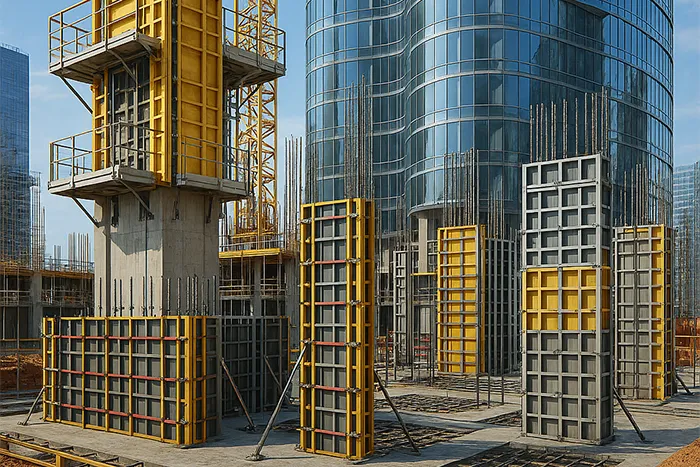
3. Key Features of a Good Residential Formwork System
A superior residential formwork system must balance performance, practicality, and economics. Here are the essential features:
- Durability: It should withstand concrete pressure, weather, and repeated use without deforming. Materials like steel or aluminum excel here, ensuring longevity in variable residential site conditions.
- Ease of Use: Quick assembly and disassembly reduce labor time. Lightweight options, such as plastic or aluminum formwork systems, allow smaller teams to handle them efficiently, ideal for residential projects with limited manpower.
- Cost-Effectiveness: Initial and operational costs matter. Cost-effective formwork minimizes waste and reuse cycles, like reusable panels that lower per-project expenses over time.
- Surface Finish Quality: Smooth, defect-free surfaces reduce finishing work. High-quality systems provide even textures, enhancing the final aesthetic of residential structures.
- Reusability & Sustainability: Systems that can be reused 50-100 times cut material needs. Eco-friendly choices, including recyclable plastics, align with green trends, reducing environmental impact in residential construction.
These features ensure the best formwork systems for residential construction deliver value, safety, and efficiency.
4. Types of Formwork Systems
Residential construction relies on a variety of formwork systems, each tailored to specific project needs, structural requirements, and budget constraints. The choice of formwork affects construction speed, labor efficiency, material usage, and the quality of the finished concrete surface. Traditional systems like timber and plywood offer flexibility and affordability for small-scale or custom designs, while modern alternatives such as aluminum, steel, and plastic provide durability, reusability, and faster assembly for medium to large residential projects. Each system brings unique advantages and limitations, from ease of handling and precision to environmental sustainability, allowing builders to select the most suitable solution for walls, slabs, columns, and other structural elements. Understanding the differences between these types helps ensure efficient, cost-effective, and high-quality residential construction.
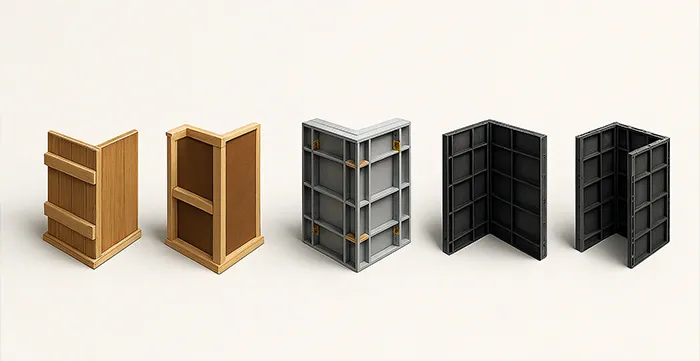
4.1. Timber Formwork
Timber formwork is a traditional, cost-effective solution for residential concrete construction, using wooden planks, beams, and supports to create custom molds for foundations, walls, and other structures. Made on-site from softwoods like pine or spruce, it offers flexibility for unique home designs and is ideal for single-family or small-scale projects. While simple to assemble, it requires skilled carpenters to ensure accuracy, prevent leaks, and maintain stability, with modern enhancements like clamps improving safety. Proper wood seasoning prevents warping, and its renewable nature adds an environmental benefit, though reuse or careful disposal is recommended. Overall, timber formwork remains a practical, adaptable, and eco-friendly choice for residential builders seeking affordable, flexible concrete formwork solutions.
Advantages:
- Inexpensive and readily available materials.
- Easy to customize and modify on-site.
- Good insulation properties during curing.
- Lightweight for manual handling in residential settings.
Disadvantages:
- Limited reusability, typically 5-10 times.
- Prone to warping, swelling, or rotting from moisture.
- Requires more labor for assembly and stripping.
- Poorer surface finish compared to metal options.
4.2. Plywood Formwork
Plywood formwork involves engineered wood sheets, often overlaid with phenolic resin for smoothness, used as facing panels in residential molds. It’s an upgrade from basic timber, providing uniform strength and resistance to bending. In residential construction, plywood is layered over timber frames for slabs and walls, ensuring consistent shapes. Its manufacturing process bonds multiple veneers, making it stronger and more stable than solid wood. Common in multi-story apartments, it allows for larger panels that speed up setup. Waterproof variants enhance durability in wet climates. Plywood’s versatility suits curved or intricate designs, with thicknesses from 12-18mm standard for residential loads. It’s cost-effective for medium-scale projects, balancing affordability with performance. Sustainability comes from using plantation woods, and it’s recyclable. However, edge protection is needed to prevent damage. This system integrates well with props and ties, making it popular for efficient, high-quality finishes in home builds.
Advantages:
- Better strength and stability than timber.
- Smooth surface for superior concrete finish.
- Reusable up to 20-30 times with care.
- Lightweight and easy to cut for custom fits.
Disadvantages:
- Susceptible to water damage if not treated.
- Higher initial cost than basic timber.
- Edges can chip, requiring maintenance.
- Limited load-bearing for very heavy pours.
4.3. Aluminum Formwork
Aluminum formwork systems consist of extruded aluminum panels and supports, prefabricated for quick assembly in residential construction. Lightweight yet robust, they are ideal for repetitive layouts like apartment blocks. Panels interlock with pins or wedges, minimizing joints and leaks. In residential settings, they’re used for walls, slabs, and beams, offering high precision. The material’s corrosion resistance suits humid environments, and its modularity allows for easy transport. Developed as a modern alternative, aluminum reduces cycle times to 4-5 days per floor. It’s engineered for loads up to 60 kN/m², ensuring safety. Sustainability is boosted by infinite recyclability and low waste. For best formwork systems for residential construction, aluminum shines in urban projects needing speed. However, design software aids planning. Overall, it transforms residential builds with efficiency and quality.
Advantages:
- Highly reusable, over 100 times.
- Lightweight, reducing labor and crane needs.
- Excellent surface finish, minimal plastering.
- Fast assembly for shorter project timelines.
Disadvantages:
- High upfront cost.
- Less flexible for non-standard shapes.
- Requires skilled workers for handling.
- Potential denting from impacts.
4.4. Steel Formwork
Steel formwork, including Steel Column Shuttering, provides a durable and high-strength solution for residential concrete construction, using metal sheets and welded or bolted frames to create precise molds for load-bearing elements such as columns, shear walls, and basements. Factory-made panels ensure consistent quality and coatings prevent rust, while the rigidity of steel maintains straight lines and minimal deflection under high pressure. Reusable for over 100 cycles with proper maintenance, steel formwork is ideal for large panels with fewer joints, improving efficiency in repetitive residential projects and complexes. Although heavy and requiring machinery for handling, it is cost-effective over time and environmentally friendly due to recyclability. Particularly in seismic zones, Steel Column Shuttering excels by providing robust, reliable performance for safe, long-lasting residential structures.
Advantages:
- Exceptional durability and strength.
- High reusability, up to 200 times.
- Waterproof and fire-resistant.
- Precise dimensions for quality builds.
Disadvantages:
- Heavy, requiring equipment for transport.
- Expensive initial investment.
- Prone to rust without protection.
- Difficult to modify on-site.
4.5. Plastic Formwork
Plastic formwork employs modular panels from polypropylene or composites, snapped together for residential molds. It’s emerging for its lightness in walls and slabs. In homes, it’s used for quick setups in tight spaces. Non-absorbent, it resists chemicals and weather. Panels are interlocking, reducing support needs. Developed for sustainability, it’s 100% recyclable. Reusability reaches 80-100 times. Low weight cuts labor costs. For cost-effective formwork, it’s ideal for small residential projects. However, heat sensitivity requires monitoring. It promotes green building with minimal waste.
Advantages:
- Extremely lightweight and easy to handle.
- Corrosion and water-resistant.
- Quick assembly without skilled labor.
- Eco-friendly and fully recyclable.
Disadvantages:
- May deform under high temperatures.
- Lower load capacity than metals.
- Higher cost than timber initially.
- Limited availability in some regions.
5. Comparison Table
| Feature | Timber | Plywood | Aluminum | Steel | Plastic |
|---|---|---|---|---|---|
| Cost | Low | Moderate | High | High | Moderate |
| Durability | Low | Moderate | High | Very High | Moderate |
| Ease of Use | Moderate | High | High | Low | Very High |
| Reusability | Low (5-10) | Moderate (20-30) | Very High (100+) | Very High (100+) | High (80-100) |
| Suitability for Residential | High for small/custom | High for medium | High for repetitive | High for heavy-load | High for quick/light |
This table highlights how aluminum and plastic offer balance for best formwork systems for residential construction, while timber suits budget projects.
6. Best Formwork Systems for Residential Construction in 2025
in 2025, the best formwork systems for residential construction focus on efficiency, sustainability, and modularity, keeping pace with trends like prefabrication and green building materials. for small-scale homes such as single-family houses, timber or plywood formwork remains a cost-effective choice, offering flexibility for custom designs with low upfront costs. mid-sized projects, including townhouses, benefit from aluminum formwork systems, which are lightweight, reusable, and allow rapid assembly, reducing construction cycles to 4–5 days, perfect for tight urban sites and repetitive floors. large residential complexes gain from modular plastic or hybrid steel-aluminum formwork, as well as manhole forms, promoting sustainability through recyclability and minimizing waste. cutting-edge trends like 3d-printed formwork and ai-optimized designs further enhance precision and efficiency. overall, for 2025 residential builds, aluminum, plastic formwork systems, and manhole forms offer the ideal balance of speed, cost-efficiency, and eco-friendly construction, making them the top choice for modern builders.
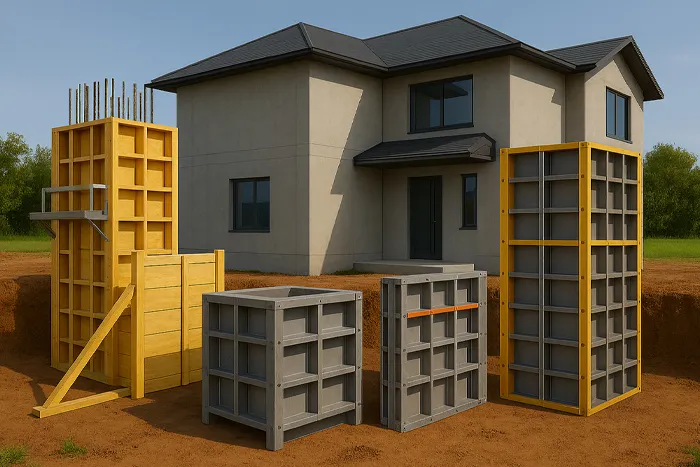
7. Tips for Choosing the Right Formwork
- Assess Budget: Opt for cost-effective formwork like timber for one-off projects; invest in aluminum for long-term savings through reusability.
- Consider Labor: Choose lightweight options such as plastic or aluminum formwork systems if skilled workers are scarce, easing handling and setup.
- Evaluate Project Size: Small homes suit flexible timber formwork; larger residences need durable steel for heavy elements.
- Factor Environmental Considerations: Prioritize sustainable, recyclable systems like plastic to meet green codes and reduce waste.
- Check Site Conditions: For wet areas, select water-resistant materials; use modular systems for constrained spaces to boost efficiency.
These tips ensure the best formwork systems for residential construction match your needs.
8. B.F.S Industries, Leading Manufacturer and Supplier of Residential Formwork Systems
B.F.S Industries is a trusted manufacturer and supplier of high-quality residential formwork systems, delivering innovative solutions for builders and developers across projects of all sizes. Specializing in timber, plywood, aluminum, steel, and plastic formwork, our company provides durable, reusable, and efficient molds designed to meet the needs of modern home construction. Focused on precision, sustainability, and cost-effectiveness, B.F.S Industries ensures every formwork solution enhances structural strength, accelerates project timelines, and supports eco-friendly building practices. From single-family homes to large residential complexes, we supply reliable formwork systems that empower builders to achieve superior quality with ease.
Conclusion
In residential construction, selecting the right formwork system is crucial for achieving efficiency, durability, and high-quality results. From traditional timber and plywood to modern aluminum, steel, and plastic systems, each type offers distinct advantages depending on project size, design complexity, labor availability, and budget. Timber and plywood remain cost-effective for small-scale or custom homes, while aluminum and plastic provide speed, reusability, and eco-friendly benefits for medium to large residential projects. Steel formwork ensures maximum strength and precision for heavy-load or seismic-resistant structures.
As construction trends evolve in 2025, the focus is on modular, sustainable, and high-performance formwork solutions that reduce waste, cut labor costs, and enhance overall project quality. By carefully considering factors such as cost, labor, project scale, and environmental impact, builders can select formwork systems that optimize efficiency, improve structural integrity, and create aesthetically appealing, long-lasting homes. Investing in the right formwork ultimately supports smarter, faster, and greener residential construction.
